| Srl | Item |
| 1 |
ID:
157608
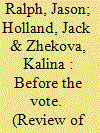

|
|
|
|
|
| Summary/Abstract |
The literature of recent UK policy toward Syria focuses on the 2013 chemical weapons crisis. We examine policy discourses leading up to that. The government supported the removal of Assad but faced the challenge of explaining how that would be realised. Given its unwillingness and inability to mobilise support for military intervention, or to tailor policy goals to match available means, government strategy arguably lacked credibility. Our purpose is to examine how the government tried to close this ends means gap and how, having failed to do that, its ‘discursive strategy’ legitimised its approach. We argue the resources for the government’s discursive strategy on Syria can be found in the earlier articulation of ‘liberal conservatism’. A policy that from an ideal-liberal or ideal-conservative position might have been criticised as half-baked was maintained by a strategy that gave consideration to, but did not completely follow through on, either archetype. Drawing on an analysis of 2,152 sources and supplemented by elite interviews, we illustrate how this strategy managed the interplay of two basic discourses: a liberal insistence that the UK should support ‘the Arab Spring’ and a conservative insistence that military intervention was imprudent because ‘Syria was not Libya’.
|
|
|
|
|
|
|
|
|
|
|
|
|
|
|
|
| 2 |
ID:
060412
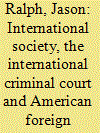

|
|
|
| 3 |
ID:
090359
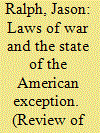

|
|
|
|
|
| Publication |
2009.
|
| Summary/Abstract |
This article examines the US response to the 9/11 terrorist attacks using Carl Schmitt's concept of the exception. It argues that the Bush administration's response is consistent with Schmitt's view, which argued that US policy continued the historical practice of drawing lines that separated 'civilisation' from zones of exception where the normal laws governing warfare did not apply. This suggests that the state of exception declared after 9/11 is not contingent on the rise and fall of the terrorist threat, rather it is the latest manifestation of 'global linear thinking' and therefore a permanent feature of American hegemony. However, the article does not accept this pessimistic conclusion. US policy since 9/11 fits squarely with a Schmittian explanation only because conservative nationalists have used the war on terror to help reconstruct a sense of American 'exceptionalism'. An alternative reading of how American liberalism should respond to terrorism can be found in the manner in which the Bush administration's policy was rejected by the US Supreme Court.
|
|
|
|
|
|
|
|
|
|
|
|
|
|
|
|
| 4 |
ID:
139590
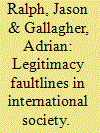

|
|
|
|
|
| Summary/Abstract |
There is a perceived legitimacy deficit in contemporary international society. A symptom of this is the political contestation surrounding the 2011 Libyan crisis and its influence on the 2011–13 Syrian crisis. This involved criticism being levelled at the coalition led by the so-called Permanent-3 for the way they implemented the protection of civilians mandate, as well as for the referral of the Libyan situation to the International Criminal Court. How the P3 respond to these developments will be driven in part by how this ‘legitimacy fault line’ is interpreted. The purpose of this article is to first give an interpretation that is informed by the work of contemporary English School scholars and the political theorists they draw on; and second to provide the context in which specific policy recommendations may guide the response of the P3 states. We argue that because the new legitimacy fault line divides on the procedural question of who decides how international society should meet its responsibilities rather than substantive disagreements about what those responsibilities are (that is, human protection and justice) the challenge to the liberal agenda of the P3 is not radical. However, we also argue that ignoring the procedural concerns of the African and BRICS states is not outcome neutral and could in fact do harm to both the ICC and the wider implementation of R2P. We consider two proposals for procedural reform and examine how the P3 response would impact on their claim to be good international citizens.
|
|
|
|
|
|
|
|
|
|
|
|
|
|
|
|
| 5 |
ID:
129808
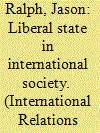

|
|
|
|
|
| Publication |
2014.
|
| Summary/Abstract |
The question of who decides when a state has not met its international responsibilities (and therefore forfeits the right to non-intervention) and what kind of international action should be taken (from limited intervention to full-blown regime change) divides liberal foreign policy thinking. To understand the nature of that division, and what is at stake, this article distinguishes 'neoliberal' from 'liberal internationalist' approaches and locates them in an English School understanding of international society. Where the latter stresses the importance of observing the procedural norms centred on the United Nations, the former contests the legitimacy of such norms if they fail to deliver substantive liberal outcomes. The article then interprets British foreign policy discourse either side of the 2003 Iraq conflict through the prism of this debate. The central claim is that a more cautious approach to the use of force and American unilateralism has not silenced the critique of the UN system and that the international reaction to the Libyan intervention prompts the kind of reflection that continues to separate neoliberal from liberal internationalist approaches.
|
|
|
|
|
|
|
|
|
|
|
|
|
|
|
|
| 6 |
ID:
155467
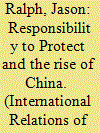

|
|
|
|
|
| Summary/Abstract |
The purpose of this article is to explore the development of a norm that emerged during a period of unqualified American hegemony – the Responsibility to Protect (R2P) – and to ask what the rise of China means for R2P norm entrepreneurs like Australia. It argues that by underpinning great power identity claims, which are instantiated by the assertion of normative positions occasionally at odds with liberal states, the rise of China has helped to highlight the contested nature of the R2P norm, in particular the license it notionally gives to the pursuit of externally imposed regime change. Drawing on an innovative combination of critical constructivism and philosophical pragmatism the paper argues that liberal states can better promote R2P in this increasingly pluralist international order by adopting a pragmatic approach to norm diffusion. This balances the demands of a dialog that is sensitive to Chinese concerns with the defense of the substantive core of the norm, human protection. It is further argued that Australia’s geopolitical position to Chinese power and an embedded identity narrative of Australia as a ‘middle power’ demonstrates a potential to act as a pragmatic norm entrepreneur. Indeed, Australia’s recent activity on the UN Security Council can be characterized in these terms.
|
|
|
|
|
|
|
|
|
|
|
|
|
|
|
|
| 7 |
ID:
140266
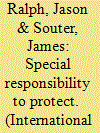

|
|
|
|
|
| Summary/Abstract |
In the summer of 2014 Islamic State in Iraq and Syria (ISIS) emerged as a threat to the Iraqi people. This article asks whether the UK and Australia had a ‘special’ responsibility to protect (R2P) those being threatened. It focuses on two middle-ranking powers (as opposed to the US) in order to highlight the significance of special responsibilities that flow only from the principle of reparation rather than capability. The article contends that despite casting their response in terms of a general responsibility, the UK and Australia did indeed bear a special responsibility based on this principle. Rather than making the argument that the 2003 coalition that invaded Iraq created ISIS, it is argued that it is the vulnerable position in which Iraqis were placed as a consequence of the invasion that grounds the UK and Australia's special responsibility to protect. The article addresses the claim that the UK and Australia were not culpable because they did not act negligently or recklessly in 2003 by drawing on Tony Honoré's concept of ‘outcome responsibility’. The finding of a special responsibility is significant because it is often thought of as being more demanding than a general responsibility. In this context, the article further argues that the response of these two states falls short of reasonable moral expectations. This does not mean the UK and Australia should be doing more militarily. R2P does not begin and end with military action. Rather the article argues that the special responsibility to protect can be discharged through humanitarian aid and a more generous asylum policy.
|
|
|
|
|
|
|
|
|
|
|
|
|
|
|
|
| 8 |
ID:
158379


|
|
|
|
|
| Summary/Abstract |
In this paper I examine what constructivist approaches to IR tell us about how states should act when confronted by atrocity crimes in the context of a politically pluralist international society. Building on the work of theorists who responded to Richard Price and Christian Reus-Smit's call to substantiate the constructivist's claim to explain “moral progress,” and to better inform normative assessments, I claim that the constructivist emphasis on historical and social contingency does not rule out ethical standpoints, suggesting instead a “pragmatic” ethic. Norms are hypotheses rather than absolute values. The task of the pragmatic constructivist is not to establish beyond doubt the normativity of a norm—the task is to test the norm for how well its “meaning-in-use” supports action that ameliorates lived social problems. Pragmatic constructivists can commit to the Responsibility to Protect (R2P) as an idea that might reconcile various communities of normative practice and ameliorate vulnerability without upsetting international order. To the extent particular practices (e.g., prevention) have proven (and continue to prove) useful in doing this, pragmatic constructivists can equate the institutionalization of those practices with normative progress. However, R2P is a “complex” norm. It recognizes that knowledge of how to respond to ongoing atrocity is context specific and cannot therefore be fixed. The task of the pragmatic constructivist here is to assess the practical judgment of those that claim to speak for the norm by weighing the consequences of acting out their prescription in the specific context of a particular crisis. I test the meanings of R2P in use during the Syria crisis from 2011 to 2012. R2P was problematic to the extent certain meanings reinforced policy ends (e.g., protection through political/criminal accountability) that were impractical and pursued at the expense of non-ideal but realizable goals (e.g., protection through peace/aid).
|
|
|
|
|
|
|
|
|
|
|
|
|
|
|
|